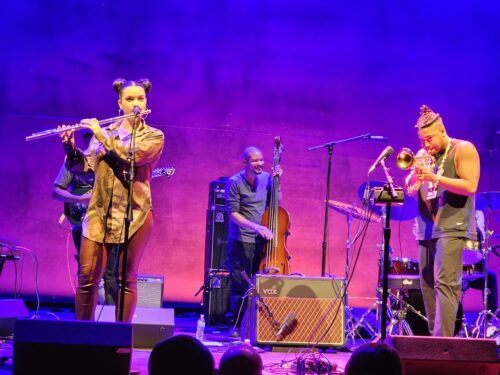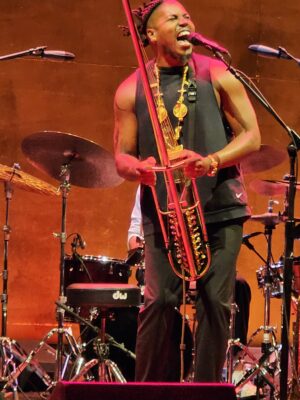Chief Adjuah and his Melodic Hipped Band Electrified Audiences at Kennedy Center

By Danny R. Johnson – Cultural Music Critic
WASHINGTON, DC–Chief Xian aTunde Adjuah, formerly known as Christian Scott aTunde Adjuah, celebrated the cultures of New Orleans Black Indians, West Africa, and the African diaspora during a gig on August 18, 2023, at the John F. Kennedy Center for the Performing Arts in Washington, DC. Renowned as an award-winning and highly regarded jazz trumpeter, Chief Adjuah, as he is often called, relied primarily on his voice and an instrument he designed known as Adjuah’s bow. He described it as an “electric double-sided n’goni, kora, harp.”
Two-time Edison Award–winning and five-time Grammy Award®–nominated trumpeter, composer, and producer Chief Adjuah was joined by an equally impressive and gifted band with Elena Pinderhughes, flute, Luques Curtis, bass, Cecil Alexander, guitar, Lawrence Fields, keyboard, Elé Howell, drums, Weedie Braismah, percussions. The seven selections performed by the band highlighted the unique musical idiom Adjuah progenerated called “stretch music,” a jazz-rooted, genre-blind musical form that attempts to “stretch” jazz’s rhythmic, melodic, and harmonic conventions to encompass multiple styles, languages, and cultures.
Since his musical debut in the 1990s, Chief Adjuah has improved, steadily developing his compositional approach in ever more transparent ways. His concept of “stretch music,” eloquently displayed on his latest album, “Bark Out Thunder Roar Lighting,” was in full force at the Kennedy Center show and demonstrated his maturity and interest in new directions of jazz and world music.
Right from the opening set, Chief Adjuah entertained the sold-out and standing-room audience with an astonishing musical piece that had the audience mesmerized by its powerful lyrical resonations from the spirits of African griots. The interactions with percussionist Braismah were total and telepathic, two harmonic adventures on the loose at a moment when, with the spirits of Miles Davis and Max Roach as tutelary geniuses, the rules of jazz and world music collided, and jazz improvisation were susceptible to almost endless interrogation.
The incomparable flutist, Pinderhughes, and Chief Adjuah blended astoundingly well on several selections, combining his instinctive exuberance with Pinderhughes’ adding curious timbrel effects to one of the most straight-ahead solos of the evening.

Chief Adjuah and his band remained focused and intact with each other from the start to the end. They offered a solidly funky combo of music that a computer might have almost programmed. The chemistry and vibes between the musicians were impeccable! All the performances hinged on Chief Adjuah’s bow and trumpet. Alexander’s guitar smoked chords and rhythms that even Jimi Hendrix would applaud. Fields on the keyboard provided a jagged harmonic sense and a flexible rhythm approach, which tied together beautifully. Fields showed comparable patience and caution in a setting of group improvisation. During much of the 115-minute show, he played simple, semi-repetitive figures or nothing at all. Rather than overwhelm his fellow musicians and leave the percussionist scampering to keep up, Fields integrates into the group with lines that blossoms from a motivic statement into a busy, two-handed abstract flurry that is more like a rippling tide than a volcanic explosion. We can appreciate the genius that he possesses.
Bassist Curtis has proven time and time again why he is one of the most accomplished bass players living. Not only is he at home in a large ensemble setting, but he also joined the band for a trio of pieces. One of the selections highlighted his positive and thoughtful basslines, propelling the rhythm section to support some fine solos and ensemble playing and giving him solo space for his inventive melodic ideas and fine chordal double stopping—a total delight by the world’s most consummate bassist.
Drummer Howell doesn’t play phrases you would expect or hit the instrument you would expect him to strike at any given time. But when he does hit, it all fits in beautifully. Whether he introduces a persistent triplet figure on the cymbal while the rest of the band keeps on the groove or isolates the bass drums for solo kicks while maintaining the time going with his right hand, Howell forces the audience to sit up and listen and not merely lay it all right in their laps.
Percussionist Braismah is a lifelong student of African rhythms and can transport the audience to a place where you can feel the pains, joys, and triumphs of African people and their descendants. And this is precisely the mission of Chief Adjuah and band members: To educate and entertain, at the same time, the struggles of indigenous people around the world. Braismah accomplished this task by pouring his mind, body, and soul into his percussion instruments so audiences could appreciate the most holistic manifestations of the African experience.
Braismah’s arrangements range from breathtaking, expelling excitement to melting tenderness. And he had the confidence and aplomb on many occasions to carry off extended numbers that left the audience gasping for more! Braismah presented a marvelously melancholic version of African, Afro-Cuban, and Pan-African interactions and percussionist brilliance as if he was in a trance in commutation with the ancestors. You can see the audience was gripped by his every move as if he was revealing to them the lament for human nature, liberated midway by “Somos libre de verdad.” (We are genuinely free)
Chief Adjuah and members of his ensemble are the Rosetta Stone of modern jazz and world music. This band stands as a monumental testament to the vital work serious artists must dedicate themselves to stray above the status quo. When the future history of the music is written, Chief Adjuah and the sessions he presents to audiences worldwide will be adduced as a turning point.






